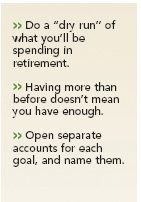Article
7 tips to boost savings
Author(s):
Your Money

Temptations to spend abound. And despite a nice income and a large home, a number of my clients consistently put almost nothing in the bank. One 58-year-old cardiologist has a huge income, a Town & Country lifestyle, and a paltry $50,000 in his retirement account.
How can you improve your finances and become better prepared for the future?
But lack of self-discipline is just one factor. Failure to envision the future is another. Many of us give no thought to the fact that some day Medicare may not cover large medical bills; or newer treatments and approaches could become too expensive for you; or that you'll be required to pay much more out of pocket. Some doctors may even expect to get discounts from young colleagues. Given declining profit margins in medicine, that's not likely.
In addition, people see how the value of their house or stocks have risen, and figure they're all set. But you have to remember that just because you have more than before doesn't mean you have enough. So how do you convince yourself to save more and actually carry through with it? Here are some ways to make it less painful:
Picture retirement without enough money. Just as starvation in faraway continents becomes real only when we see it on TV, most of us have no image of struggling in retirement. Do a dry run. Pretend you're retiring next month. How much will your savings cover? If you're planning to move to an area where living costs are cheaper, get on the Internet and check out real estate and taxes in that area, and see what you could actually get. Can you afford what you'd want? Project your expenses as if Medicare covered half of what it currently covers. I've told clients that if they don't start saving more, their idea of a great dinner once they've retired will be a night out at Denny's.
Look for livable ways to cut your spending. Severely restrictive budgets rarely last long, just as too-rigid diets beg to get broken. You're more likely to be successful with the "harm reduction" method. If you typically go out to dinner twice a week, cut back to once. If you always buy the top of the line, choose items one notch down. Deny yourself one thing you'd like to buy, but don't eliminate everything. Bank the savings.
Announce your savings plan to your friends. Tell them you plan to save a specific large amount of money in the coming year. That gives you a legitimate reason for not keeping up with their spending or for opting out of expensive activities. Issue a public challenge, and promise that if you don't reach your target, you'll treat everyone to drinks.
Avoid temptation. Just like the motto, "If you're trying to lose weight, don't keep ice cream in the freezer," stay away from situations that encourage spending. Don't spend too much free time at the malls. Leave your charge cards at home except when you're going on trips. Put money into accounts that charge a penalty for early withdrawal. Use a debit card-not a credit card-for purchases. This will prevent you from spending more than you have, and will avoid finance charges.





